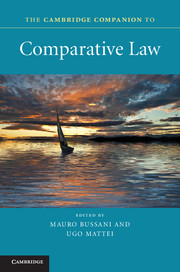Book contents
- Frontmatter
- Contents
- Contributors
- Abbreviations
- Preface
- Part I Knowing comparative law
- Part II Comparative law fields
- Part III Comparative law in the flux of civilizations
- 12 The East Asian legal tradition
- 13 The Jewish legal tradition
- 14 The Islamic legal tradition
- 15 The sub-Saharan legal tradition
- 16 The Latin American and Caribbean legal traditions
- 17 Mixed legal systems
- 18 Democracy and the Western legal tradition
- Index
- References
17 - Mixed legal systems
Published online by Cambridge University Press: 05 May 2013
- Frontmatter
- Contents
- Contributors
- Abbreviations
- Preface
- Part I Knowing comparative law
- Part II Comparative law fields
- Part III Comparative law in the flux of civilizations
- 12 The East Asian legal tradition
- 13 The Jewish legal tradition
- 14 The Islamic legal tradition
- 15 The sub-Saharan legal tradition
- 16 The Latin American and Caribbean legal traditions
- 17 Mixed legal systems
- 18 Democracy and the Western legal tradition
- Index
- References
Summary
Introduction
The notion of mixed legal systems is essentially a modern idea that increasingly shapes discussions about the nature of the world’s legal systems. A mere fifty years ago, mixed systems were treated as legal aberrations and were scarcely discussed. The focus was on a coherent ordering of les grands systèmes, and no space was found in taxonomies for composites and hybrids. Under the influence of ‘mixed jurisdiction’ studies and legal pluralism, however, there is growing awareness that mixed systems, whether restrictively or expansively defined, are a widespread and recurrent reality. They have recurred too often and have endured too long to be regarded as accidents and anomalies. A recent study maintains that ninety-one legal systems may be categorized as ‘civil law’, and forty-two are ‘common law’. However a higher number – ninety-four – are listed as ‘mixed’ systems. The study arranged these mixtures into ten subcategories, under such rubrics as ‘Common law and Muslim law’, ‘Civil law and customary law’, ‘Muslim law and customary law’, and ‘Common law and civil law’. It is thus apparent that all the traditions discussed in the earlier chapters of this Companion – the Western, East Asian, Jewish, Islamic and sub-Saharan – have provided the legal material from which this vast array of hybrids was created. (See the appendix to this chapter for the legal systems listed.)
An important difference of opinion, however, exists over the proper meaning and constituent elements of a mixed system. Scholars in the ‘mixed jurisdiction’ tradition, who follow the footsteps of early British comparatists (see section 17.2 below), tend to restrict its scope to a single kind of hybrid where the most comparative research has been done – mixtures of common law and civil law. In that perspective the number of mixed systems in the field shrinks to fewer than twenty around the world. However, many scholars under the influence of legal pluralism (including the comparatists who conducted the Ottawa study just mentioned) use a more expansive, factually oriented definition that enlarges the field and has no obvious limits.
- Type
- Chapter
- Information
- The Cambridge Companion to Comparative Law , pp. 368 - 383Publisher: Cambridge University PressPrint publication year: 2012
References
- 5
- Cited by



